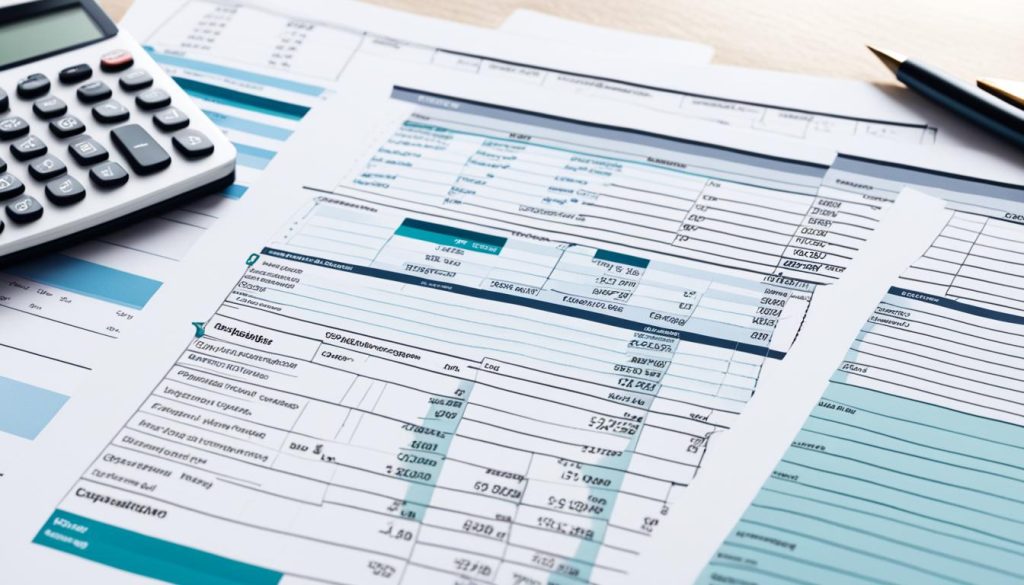Checking how well your bookkeeping system works is key to keeping your financial records right and fast. By doing a full check-up on your bookkeeping, you can see what needs to get better. In this article, we’ll talk about why it’s important to look at your bookkeeping’s performance. We’ll also give tips on how to check if your bookkeeping system is doing its job well.
Key Takeaways:
- Evaluating your bookkeeping system is essential for accuracy and efficiency.
- Assessing performance helps identify areas for improvement.
- Key metrics include accuracy, timeliness, adherence to standards, and effectiveness of controls.
- Optimizing operations and utilizing technology improve bookkeeping performance.
- Continuously monitoring and training staff ensure ongoing improvement.
The Importance of Bookkeeping Performance Evaluation
It’s vital to check how well your bookkeeping system works. First, it makes sure your financial records are right. This is key for smart business choices. Second, by looking at bookkeeping, you find ways to work better and save resources. Also, spotting errors early stops bigger issues later.
Evaluating your bookkeeping lets you see how well your finances are handled. You can check if transactions are right, if records are complete, and if you’re following the rules.
A detailed look at bookkeeping can show you what needs work. By checking things like how fast you record transactions and if your checks work, you can find problems. Then, you can make changes to fix them and make bookkeeping better.
The Benefits of Bookkeeping Performance Evaluation
Regularly reviewing your bookkeeping brings many advantages:
- Accurate financial records: Checking bookkeeping ensures your financial info is right. This helps you make smart choices with reliable data.
- Improved efficiency: By assessing bookkeeping, you find ways to be more efficient. This saves time and resources.
- Early error detection: Performance evaluation catches mistakes early. This prevents small errors from becoming big problems.
- Optimized decision-making: Accurate financial records let you make better business choices. This is about the health and direction of your company.
Regular bookkeeping checks are crucial for good financial management. By continuously evaluating and improving your bookkeeping, you can better run your business. This leads to smarter decisions and more success financially.
Key Metrics for Assessing Bookkeeping Performance
To check how well your bookkeeping system is doing, it’s vital to look at key metrics. These metrics offer deep insights into how effective and efficient your handling of finances is. By looking at these, you can spot where to get better and make your bookkeeping even stronger.
Here are the key metrics for assessing bookkeeping performance:
- Accuracy of financial reports: This gauge lets us know how precise and correct our financial records are. It checks if your reports truly show how your business stands financially. Having accurate reports is key for making smart choices and analyzing finances well.
- Timeliness of recording transactions: This measures how quick you are to put transactions in your bookkeeping system. Recording fast means your financial records are always current, giving you instant insights. If you’re slow, you might have gaps or mistakes in your data, affecting decisions.
- Adherence to accounting standards and regulations: It’s crucial to follow accounting rules and laws for trusted financial records. This metric sees how well your bookkeeping lines up with these rules. Sticking to standards ensures your data is consistent, accurate, and clear.
- Completeness of records: This looks at how detailed and full your bookkeeping records are. It checks if every financial move is documented properly. Complete records give a full picture of how your business is doing, helping in analysis and choices.
- Effectiveness of internal controls: Internal controls are steps to protect your money, stop fraud, and ensure accuracy. This measures how good these controls are at finding and stopping mistakes. Strong controls make your financial records more reliable and trustworthy.
By looking at these metrics and comparing them with standards or your own goals, you get key insights into your bookkeeping. This helps you see what’s working and what’s not, guiding you to make your bookkeeping better.
“Analyzing key metrics allows you to assess the overall effectiveness and efficiency of your bookkeeping system, guiding you in making necessary improvements and optimizations.” – Source: First source, Second source
The Importance of Bookkeeping Analysis
Checking your bookkeeping is key for accurate, effective, and efficient financial handling. It lets you spot where to improve, make smart decisions, and strengthen your bookkeeping. By looking at key metrics, you can understand how well your system is doing and act to make it better.
| Key Metric | Description |
|---|---|
| Accuracy of financial reports | Measures the precision and correctness of financial records. |
| Timeliness of recording transactions | Assesses the promptness of transaction recording. |
| Adherence to accounting standards and regulations | Evaluates compliance with relevant guidelines and requirements. |
| Completeness of records | Examines the thoroughness and comprehensiveness of bookkeeping records. |
| Effectiveness of internal controls | Assesses the functionality of internal control processes and procedures. |
By diving into these metrics, you gain a complete view of your bookkeeping’s performance. You can then act to boost accuracy, efficiency, and follow rules closely. Analyzing your bookkeeping is a powerful way to improve your financial handling and ensure your business thrives long-term.
Assessing the Effectiveness of Internal Controls
Internal controls are essential for good bookkeeping. It’s crucial to check how well your internal controls are working. This means looking at your procedures for separating duties, authorizing transactions, and keeping an eye on everything. By reviewing how your bookkeeping measures up to your internal controls, you can spot any issues that need fixing.
For instance, making sure different people handle separate financial tasks reduces mistakes or fraud. Checking authorization procedures helps ensure that all transactions are properly reviewed. Looking at how you monitor activities can confirm that you’re keeping a close eye on everything. This helps prevent and fix any problems that come up.
Keeping tabs on your bookkeeping, in light of your internal controls, not only makes your bookkeeping better but also makes your financial records more trustworthy. By identifying and fixing any problems, you can make your internal controls stronger. You might need to update your rules, offer more training, or use new technology to help with this.
Reviewing your internal controls thoroughly helps make your bookkeeping better and reduces the chances of mistakes or fraud. This makes your bookkeeping smoother and gives everyone confidence in your financial reports.
Key points:
- Evaluate the segregation of duties to minimize the risk of error or fraud.
- Assess authorization procedures to ensure proper checks and balances.
- Examine monitoring mechanisms to verify oversight and detect potential issues.
- Implement improvements to strengthen internal controls and enhance bookkeeping productivity.
| Benefits of Assessing Internal Controls | Actions to Enhance Internal Controls |
|---|---|
| Improved accuracy and reliability of financial records | Revising policies and procedures |
| Enhanced bookkeeping productivity | Providing training and education for staff members |
| Minimized risk of errors or fraudulent activities | Integrating technology solutions for automation and real-time monitoring |
Optimize Your Bookkeeping Operations
Looking at your bookkeeping performance can help make your operations better. By spotting areas that need work, you can make changes. You can streamline your processes, cut out extra steps, and work more efficiently. Here are some tips to help you make your bookkeeping better:
- Adopt new technologies: Check out and put money into bookkeeping software or tools that can do tasks automatically and make data entry easier. Using tech can really improve how well and accurately you do your bookkeeping.
- Improve staff training and education: Keep teaching your bookkeeping team to make sure they know how to do their jobs well. Spending on their training can make them better at making your bookkeeping better.
- Consider outsourcing: If some bookkeeping tasks take too much time or resources, think about hiring outside experts to handle them. This can let your own team focus more on the main parts of your business.
By making your bookkeeping better, you can save time, make fewer mistakes, and manage your finances better overall. Start by looking at your current methods and see where you can improve. This will make your processes smoother and lead to better financial results.

Utilizing Technology for Bookkeeping Performance Evaluation
Technology greatly aids in assessing bookkeeping performance and boosting productivity. By using accounting software and tools for automation, you can make processes smoother. This reduces errors made by hand and provides access to precise, up-to-date data. You can thoroughly review your bookkeeping system’s performance, checking its efficiency and effectiveness.
Technology in bookkeeping has many benefits. It allows for creating detailed reports and metrics. These give insights into how your financial records are doing. The reports show where you can get better, helping you decide how to refine your bookkeeping tasks.
Tools for automation, like software for data entry and systems for processing transactions, remove the need for entering data by hand. This boosts accuracy and saves time for your bookkeeping team to focus on bigger tasks. With less manual work, technology increases productivity and efficiency in bookkeeping. This lets you use resources in a smarter way.
Also, technology makes it easy to integrate with other areas of business. Areas like inventory management and processing payroll benefit from this. This integration stops the need for entering the same data more than once. It ensures consistency across systems, making your financial records more accurate and reliable.
Using technology for evaluating bookkeeping performance helps you better your operations and overall performance. The insights from technology-driven reviews let you make choices based on data. This helps your business comply with accounting standards and make smart decisions.
Benefits of Utilizing Technology for Bookkeeping Performance Evaluation:
- Accurate and real-time data for a comprehensive performance review.
- Generation of detailed reports and metrics for insights into bookkeeping effectiveness.
- Reduction of manual errors through automation tools.
- Enhanced productivity by minimizing manual work.
- Seamless integration with other business functions for improved efficiency.
Technology helps you improve how you do bookkeeping, making your operations more efficient and your records more accurate. By tapping into technology’s potential, you can keep leading in the fast-paced world of bookkeeping. This drives your business towards success.
The Role of Bookkeeping Consultants
Bookkeeping consultants are key to improving your bookkeeping. They have the knowledge and experience to check your bookkeeping practices and find ways to make them better. Their advice helps make your bookkeeping better, ensure you follow accounting rules, and work more efficiently.
They give you new ideas to find things you might be missing and show you the best ways to do things. They can help you use automated tools and make your financial records more accurate. With their help, you can make smarter business choices using reliable data.
“Bookkeeping consultants provide a valuable outside perspective that can help you uncover blind spots and identify opportunities for improvement. Their expertise can enhance the productivity and overall effectiveness of your bookkeeping system.”
Bookkeeping consultants work with you to create custom solutions for your specific needs. They can help you put in place strong controls, improve how you work, and make sure you have good process documents. Working with them helps you make your bookkeeping better and more efficient.
Enhancing Bookkeeping Productivity
Improving productivity is a big goal for bookkeeping consultants. They can spot slowdowns and suggest where to use automation. This means your team has more time for important work. By using technology and making workflows simpler, consultants help your team work better.
They also guide you on using accounting software for better reporting. This helps you see how your business is doing and make good decisions.
| Benefits of Bookkeeping Consultants | Enhanced Bookkeeping Productivity |
|---|---|
| Expertise and Experience | Bookkeeping consultants bring a depth of knowledge and experience in the field, enabling them to provide tailored solutions that enhance productivity. |
| Outside Perspective | By offering an objective viewpoint, bookkeeping consultants can identify inefficiencies, blind spots, and opportunities for improvement. |
| Technology Implementation | Bookkeeping consultants can guide you in the adoption of advanced accounting software and automation tools, enabling you to streamline processes and boost productivity. |
| Optimized Workflows | These consultants help refine your bookkeeping workflows, ensuring that tasks are streamlined and resources are utilized efficiently. |
Bookkeeping consultants add value by making your bookkeeping process more productive. They help make sure your financial records are both efficient and correct. Their advice helps you make smart business decisions for success.
Continuous Monitoring and Improvement
Checking on how well you do bookkeeping shouldn’t happen just once. It should be ongoing. By keeping an eye on your bookkeeping ways, you spot areas to get better and stay current with business changes.
Doing evaluations regularly helps make bookkeeping better, more efficient, and keeps financial records accurate. Setting up a schedule for reviews and using resources well is key for continuous bookkeeping betterment.
Benefits of Continuous Monitoring
Keeping track of your bookkeeping brings lots of pluses. For one, it finds and fixes slow spots in your work. Regular checks make your work smoother and cut out steps that aren’t needed.
It also keeps you updated with new laws and rules. This way, you make sure you’re doing things right and avoid fines.
Plus, it lets you catch and fix mistakes fast. This keeps your financial info accurate, helping you make smart choices.
Establishing Regular Review Processes
To watch and tweak bookkeeping well, setting up regular check-ins is a must. This might mean looking at important info every month or quarter. This includes checking how fast transactions are recorded and if financial reports are right.
Set aside time and people, maybe even outside experts, for these reviews. They can offer useful thoughts and help. Make sure to write down and share what you find with the right people.
It’s also good to hear from your bookkeeping team. Ask them what they think and if they have ideas for doing things better.
Optimizing Bookkeeping Operations
By keeping track and improving, you’ll make your bookkeeping the best it can be. Use what you learn from checks to decide on changes, new tech, and teaching your team.
Think about using software to do routine tasks and lower mistakes. Look into hiring outside experts for some bookkeeping jobs. This lets your team focus on bigger things.
Training your team is also a smart move. Offer chances for them to learn more to keep up with the latest in accounting.
Training and Education for Bookkeeping Staff
Training and education are key to better bookkeeping. They make your staff more efficient and accurate. By teaching them what they need, your bookkeeping will get much better.
We need to focus on several training areas. These include accounting rules, how to use software, and best working methods. Training in accounting basics helps your team understand and use key concepts well.
Learning about software is also crucial. It makes using bookkeeping tools easier and makes work flow better. When your staff knows the software well, they do their jobs better and faster.
Remember, the world of accounting keeps changing. There are always new rules and standards. Continuous learning ensures your team keeps up with these changes. This helps them stay efficient and follow best practices.
Good training also means fewer mistakes. Well-trained staff make fewer errors. This keeps financial records accurate and cuts down time fixing mistakes.
Giving your team the chance to grow professionally is good for your business. It makes them more capable and boosts overall performance. Plus, staff who feel confident and valued are happier. This leads to a better workplace and keeps good employees around longer.
Training and ongoing education are vital for bookkeeping success. They improve your team’s skills and knowledge. This leads to better accuracy, efficiency, and results in your bookkeeping work.
Conclusion
Evaluating your bookkeeping is key to keeping your finances clear and well-managed. By checking key points, fine-tuning how you work, and using new tech, you can make your bookkeeping better. Always watch how things are going, teach your team, and stay on top of rules to keep improving.
Looking at important things like how correct and timely your records are helps find ways to get better. Using accounting software and tools that automate tasks can make your work smoother and faster. Keeping an eye on your processes and training regularly helps meet industry standards.
By focusing on assessing how your bookkeeping does, you give your business the info it needs. This leads to smarter choices, less risk, and more growth over time. So, dive into evaluating your methods, streamline your work, and keep aiming for better. This dedication to checking and enhancing your bookkeeping will greatly benefit your company.







